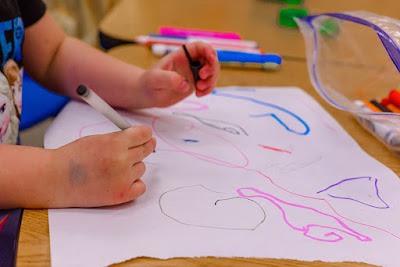At the heart of
Montessori pre-school is the practice of hands-on learning. When you walk into a classroom, you will find children spread throughout the room - at mats on the floor, in small groups at tables, or tending to the classroom pets and plants - all actively engaged in learning. This approach to education acknowledges that children learn best when they can use all their senses and when teachers create an environment that sparks curiosity and encourages exploration. Where traditional classrooms might rely on telling children what they need to know, Montessori schools focus on showing and doing for authentic learning.
Why hands-on learning?
There are many benefits to
hands-on learning, including its alignment with what we know about learning processes and development. With new concepts and skills, children learn best when they first get to grasp something concrete. A physical understanding of a concept or skill can be built upon and overtime progress to more abstract understanding. This means starting with a multisensory approach, which not only helps children gain that concrete connection but also deepens their learning the more senses are involved. Another benefit of hands-on learning is that children get to experiment. Discoveries that are made through doing and exploring for themselves tend to make a lasting impression.
The tools of the hands-on approach
In Montessori classrooms, the prepared environment is full of learning tools that encourage hands-on learning. Children can be seen engaging with number rods, bead chains, sandpaper numbers, and more. As they learn language they will touch, feel, and hear letters by working with textured cutouts and moveable alphabets. These learning tools are the physical foundation for math, reading, and writing and as children progress in their learning process, Montessori teachers introduce new material and activities that feed their interest and curiosity.
Practical life skills are hands-on
Another way that Montessori pre-school incorporates hands-on learning is by fostering practical life skills. In this way, the hands-on approach not only prepares children for deeper learning in
Montessori elementary school but also for their independence and growth in the world outside the classroom. Practical life skills can include taking care of themselves, like washing their hands, preparing a snack, putting on their shoes; or taking care of their environment, like wiping down the tables, returning materials to the shelf, sweeping the floor. While these may seem like small tasks to master, they help children develop motor skills while teaching them confidence in their ability to meet their own needs and responsibility for their part in their shared environment.
